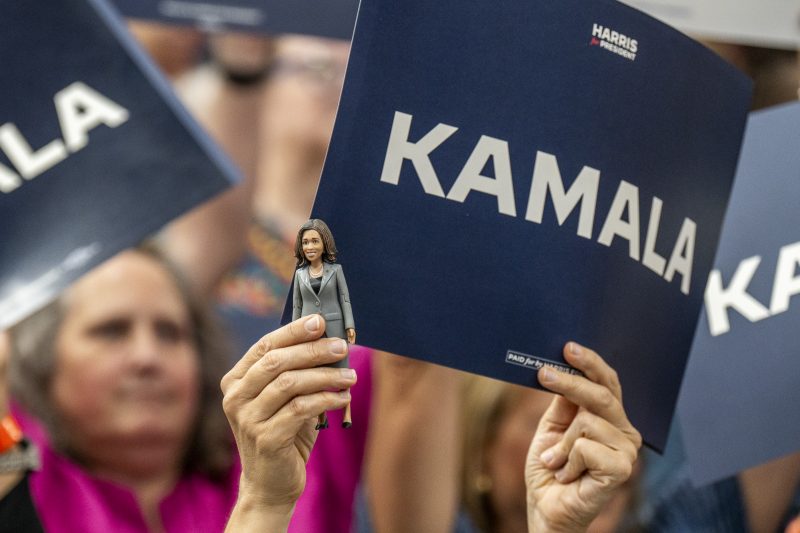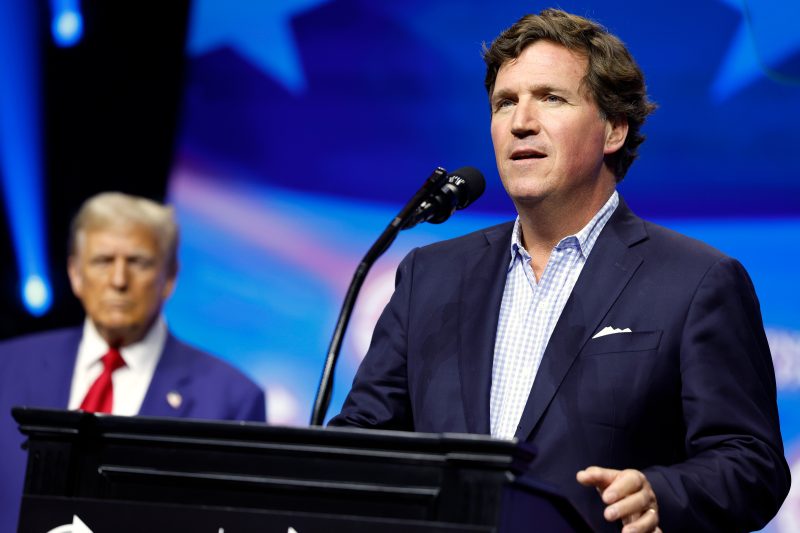
How much could Kamala Harris’s 2020 positions cost her?
Lurking beneath Democrats’ ebullience this week is the reality that their new likely 2024 presidential nominee could be a tough sell to swing voters. Vice President Harris has gotten a bump in her image ratings since she jumped into the race, but polls show she remains unpopular, on balance.
What’s more, Republicans have some real fodder for pitching Harris as too far left. Much of it traces to a failed 2020 Democratic presidential primary campaign in which Harris went further to the left than some fellow candidates, including President Biden, in ways that might not play so well in a 2024 general-election setting.
The effort to highlight those positions has now kicked off, especially in the GOP’s efforts to win back the Senate. A widely shared ad from Pennsylvania GOP Senate candidate Dave McCormick highlighted a series of Harris’s past positions while tying her to Sen. Bob Casey (D-Pa.). The National Republican Senatorial Committee put up its own version of the ad Thursday.
Given the things in those ads are likely to be fixtures of the Republican messaging ahead, it’s worth asking: What kind of liabilities could they be?
Let’s break it down, with the caveat that much of this polling is a few years old, because these issues were more front-and-center back then.
Fracking
“There’s no question I’m in favor of banning fracking.” (September 2019)
Hydraulic fracturing has led to a boom in U.S. oil and natural gas production. But it can have a negative impact on the environment through wastewater contamination and air pollution, and it has been linked to an increase in earthquakes.
Harris went further than most Democratic presidential candidates, including President Biden, who merely called for limiting fracking or increasing regulation.
While there’s not a ton of good recent polling, Gallup surveys last decade showed Americans turning against fracking, with 53 percent opposing it and 35 percent favoring it in a 2017 survey. A Pew Research Center poll this year showed 44 percent of Americans wanted more fracking — an increase mostly attributable to growing Republican support.
This is especially an issue in Pennsylvania, a crucial swing state where fracking is a major and growing industry. But a 2020 YouGov survey showed even that state was evenly split on the practice. And another survey that year showed about half of Pennsylvanians supported a fracking ban — basically the same as Harris at the time.
Banning offshore drilling
“Yes, I would. Yes.” (September 2019)
A 2022 AP-NORC survey showed 35 percent of Americans wanted to expand offshore drilling, while 32 percent wanted to keep it the same, and 31 percent wanted to reduce it.
Of course, banning it goes further than just reducing it. And the AP-NORC poll showed just 17 percent wanted to reduce offshore drilling “a lot” — suggesting few Americans would go as far as Harris did.
Overhauling ICE
“There’s no question that we’ve got to critically reexamine ICE and its role, and the way that it is being administered, and the work it is doing. And we need to probably think about starting from scratch.” (June 2018)
Republicans are pitching this as Harris joining left-wing calls to abolish the Immigration and Customs Enforcement agency. And Harris’s comments on “starting from scratch” certainly suggest an openness to such an idea — if not an embrace of it.
A 2018 AP-NORC survey found that just one-quarter of Americans favored abolishing ICE, while 4 in 10 opposed that. An NBC News/Wall Street Journal poll back then showed about twice as many voters said they’d be less likely to vote for a candidate who supported abolishing ICE (48 percent) as said they’d be more likely (25 percent).
‘Defund the Police’ movement
“ ‘Defund the Police’ — the issue behind it is that we need to reimagine how we are creating safety. … This whole movement is about rightly saying, we need to take a look at these budgets and figure out whether it reflects the right priorities.” (June 2020)
Republicans will pitch Harris as being in favor of defunding the police, even as she left her answer somewhat vague, as she did on abolishing ICE. Harris had been asked about the “Defund the Police” movement and invoked it in her answer, but she had also spoken more broadly about a racial-justice “movement” in the wake of George Floyd’s murder. At other points, she spoke about how we shouldn’t just focus on putting more police on the streets.
A September 2020 Public Religion Research Institute poll showed Americans opposed the Defund the Police movement, 62 percent to 37 percent. (The poll didn’t define Defund the Police. But the previous question showed Americans generally understood it to mean redirecting “some police department funding to other social services” rather than eliminating police departments entirely, 70-28.)
By June 2021, a USA Today/Ipsos poll showed even stronger opposition, with nearly 8 in 10 Americans opposing the movement, including 54 percent “strongly.”
It’s worth noting that these polls weren’t about actually defunding the police, but about the movement that carried that name (Democrats have strained to distinguish between the two). That suggests that Harris’s playing up the movement’s efforts could stick to her, even if she didn’t embrace actually defunding the police.
Filibuster/Green New Deal
“If [members of Congress] fail to act, as president of the United States I am prepared to get rid of the filibuster to pass a Green New Deal.” (September 2019)
Ending the filibuster — which effectively requires the support of 60 senators rather than a majority to pass legislation — has had little support. But opposition hasn’t been that strong, either.
A 2022 Fox News poll showed Americans evenly split (26-26) on ending the filibuster, but with nearly half offering no opinion. A Monmouth University poll the same year showed 43 percent wanted to keep the filibuster, while 35 percent wanted to keep it with changes, and just 17 percent wanted to scrap it entirely.
The Green New Deal is tougher to poll, but potentially more problematic for Harris. It was a package intended to provide high-quality health care to all, to guarantee well-paying jobs and to have 100 percent clean energy; critics derided it as socialist in nature and exceedingly expensive.
A 2019 Washington Post/KFF poll showed 6 in 10 Americans had no opinion of the proposal, with the rest were evenly split. Americans broadly supported nearly all of its goals, but when confronted with the idea that it would cost trillions of dollars, they opposed it 67-30.
Mandatory gun buyback program
“I support a mandatory buyback program that will get weapons of war off our streets, with civil penalties imposed for noncompliance.” (October 2019)
A 2019 Marist College poll showed 45 percent of Americans favored a mandatory buyback program for semiautomatic assault weapons like the AK-47 and AR-15.
A 2022 Monmouth survey showed 42 percent supported banning such guns and instituting a mandatory buyback program, while a clear majority opposed that. And perhaps most notably, 45 percent of Americans strongly opposed that (significantly more than the 32 percent who strongly supported it).
This proposal had significantly less support than other gun restrictions, including merely banning such weapons.
Decriminalizing illegal immigration
“I am in favor of saying that we are not going to treat people who are undocumented and cross the border as criminals.” (July 2019)
Harris at a debate also joined other Democratic presidential candidates in saying that illegal immigration should be a civil offense rather than a criminal one.
While there’s not much good data on this question, a 2018 Quinnipiac University poll found voters in Texas — a red state — were about evenly split on whether those who cross the border illegally should be “immediately charged with a crime.”



